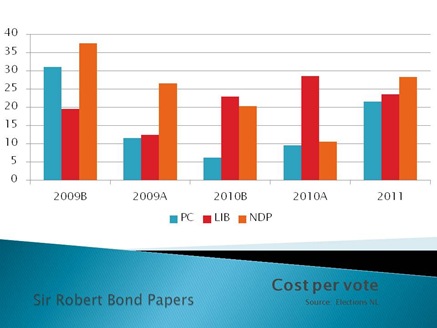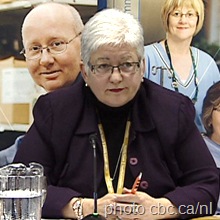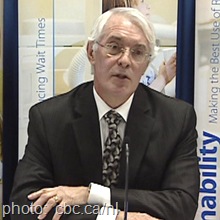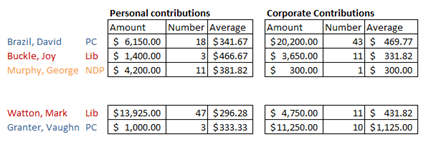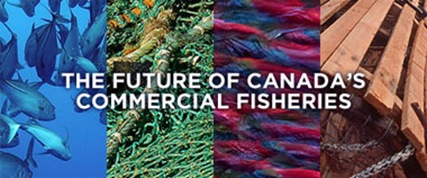Regardless of any change in the cost of other forms of energy,… we will have stability in this province that few parts of the world could depend on with the same reliability.
Did Premier Kathy Dunderdale say that? During the provincial election last fall, she told The Scope that Muskrat Falls is:
…i the way forward that will provide us a new energy we are going to need to run the place, but it will stabilize those energy prices because we don’t have the volatility of oil anymore.
In January 2012, she told the St. John’s Board of Trade that:
Our government firmly believes developing the hydro-power resources of the Lower Churchill is the key to a sustainable future for our province over the long term. Muskrat Falls is a venture that will pay for itself through lower energy costs, new export revenues and new opportunities for economic development here at home.
Maybe natural resources minister Jerome Kennedy tweeted it one day:
Hydro avoids the volatility of oil.
Might have been Nalcor’s Ed Martin:
Muskrat Falls translates to lower and stable rates for customers.
None of them did.
Premier Frank Moores said it in 1974 when local politicians first turned their attention seriously to developing the Lower Churchill. No matter what happens in other parts of the world, no matter what other technologies exist, hydro-electricity would be the future for Newfoundland and Labrador.
Economics had nothing to do with it, if you follow the comments from others involved in the project. As Philip Smith notes in his account of the development of Churchill Falls*, the Lower Churchill generated more power than the island part of the province needed in total. Environment and technology made difficult the task of running lines across the narrow gap between Newfoundland and the mainland.
The provincial government found some of the finest minds of the time, American consultants, to look at the project. They pronounced the scheme “economically viable and socially desirable.” Advances in underwater transmission in Scandinavia made the underwater link to the mainland a better bet than it might have been a decade earlier.
Moores was sold:
It is the intention of the provincial government to use power created from the Lower Churchill within the province only. It is clear to us that this position is in the best interest of all Newfoundlanders.
A second consulting firm, more smart minds from Winnipeg and Montreal, took on further studies. They predicted that there were “excellent prospects” for new industries to use the power. Their forecasts held that the whole 1800 MW output of Gull Island would be absorbed on the island by 1988. With the federal government helping to underwrite the project, the Canadian consultants predicted that island consumers would get the power for 14 mills per kilowatt hour, at a time when the going wholesale rate for power if sold to or through Quebec was less than eight mills.
The past weighs heavily on the mind of politicians in Newfoundland and Labrador. They go back to it regularly. Kathy Dunderdale, Jerome Kennedy, finance minister Tom Marshall, and the crowd at Nalcor have invoked the historical totems of Churchill Falls and Bay d’Espoir to justify their Muskrat Falls project.
What they are talking about is not the actual events, of course, but rather the imagined version of events they or others hold to be true. They are a form of cultural short-hand. They are metaphors for other ideas. They are coded speech.
What we are talking about here is not an academic abstraction, nor is it about competing interpretations – narratives, if you will – of local history. Newfoundland history, as used by politicians, is a living language.
But it is a language that has no basis on reality. It is entirely fictitious. The people who speak about the past are, like Paul Oram, fundamentally ignorant of the past. Oram was not an historical revisionist, as the title of that old post suggested. To be a revisionist requires a familiarity with both the events themselves as real occurrences and the competing stories of what those events mean.
Rather, Oram was a typical political actor of the modern Newfoundland stage. History for such an actor is not about concrete events involving people who behaved in the sort of complex world in which all of us live, simultaneously at the moment.
Their history is plastic. It can be moulded to suit any need.
Their history is not, to paraphrase Calvin, an exercise in interpreting the past to suit our current biases. Nor is history solid. Rather, history for them is air.
Former Premier Brian Peckford intruded into the Muskrat Falls world on Tuesday. His letter to Premier Dunderdale is a simple thing. The second sentence of the first paragraph is the basis for his understanding of the project and the issues:
Of course, as you know, I was heavily involved in this enterprise when I was Minister of Mines and Energy and as Premier.
Dunderdale dismissed Peckford with her characteristic arrogance:
But a message from afar, about a debate that you haven’t been engaged in, or public information sessions that you haven’t participated in, then you know it’s difficult for me to deal with.
But before she got to that she started from a very curious place:
I don’t know how close Mr. Peckford ever was to the energy files here in the province in terms of a new development. I know a great deal of work went into (Upper Churchill) redress.
This is not Dunderdale admitting her lack of knowledge of Peckford. Far from it. That is Kathy Dunderdale dismissing Peckford out of hand as knowing nothing about the subject.
If he had something useful to say, then she’d listen. But he doesn’t know anything so just pay no attention to him.
But it is Dunderdale who clearly doesn’t know anything. She is ignorant, both in the sense of not knowing anything and in the local sense of being rude.
The Premier is profoundly uninformed of events that happened in her adult lifetime. She can’t be posing or pretending. One must be not only completely unaware of the truth but also assured of its irrelevance in order to make such an obviously ridiculous comment with such complete self-assuredness.
What is truly remarkable about Dunderdale, Kennedy and Marshall is that they speak of history. They tie their decisions to the past. “We must learn from the mistakes of the Upper Churchill,” tweeted Kennedy last month. “I don't want to spend my nights wondering if I'm going to be the new Joey Smallwood,” Kennedy told an audience in Corner Brook.
For all that sort of comment, Kennedy, Dunderdale, Marshall and the others have no sense that they are displaying exactly the characteristics – arrogance and tunnel vision, among them – that led to the events in the 1960s they wish to avoid.
Such is their understanding of what our history is.
- srbp -
* Philip Smith, Brinco: the story of Churchill Falls, (Toronto: McClelland and Stewart, 1975)
